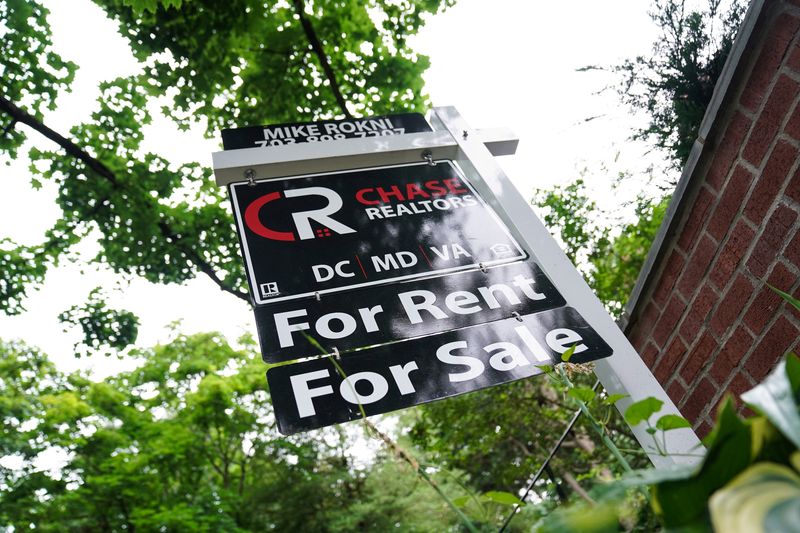By Lucia Mutikani
WASHINGTON (Reuters) – U.S. single-family homebuilding tumbled in October likely as Hurricanes Helene and Milton depressed activity in the South while permits rose slightly, indicating that an anticipated rebound probably would be muted by higher mortgage rates.
The report from the Commerce Department on Tuesday suggested that residential investment, which includes homebuilding, remained subdued at the start of the fourth quarter after contracting in the last two quarters. The housing market has been battered by higher borrowing costs as the Federal Reserve tightened monetary policy to combat inflation.
“Despite the weather impact on building down in the South, the recession in residential housing construction remains deep in the woods with no daylight seen for buyers facing supply shortages as they hunt for new single-family homes,” said Christopher Rupkey, the chief economist at FWDBONDS.
“The housing shortage and affordability issues will remain unless there is a big jump in new construction.”
Single-family housing starts, which account for the bulk of homebuilding, plunged 6.9% to a seasonally adjusted annual rate of 970,000 units last month, the Commerce Department’s Census Bureau said. Data for September was revised higher to show homebuilding rising to a rate of 1.042 million units from the previously reported pace of 1.027 million units.
Single-family starts dropped 10.2% in the densely populated South, large parts of which were devastated by Helene in late September. Milton struck Florida in October. Ground-breaking on single-family housing projects plummeted 28.7% in the Northeast, but increased 4.6% in the Midwest and the West.
Single-family homebuilding slipped 0.5% from a year ago.
Starts for multi-family housing jumped 9.8% to a pace of 326,000 units. Overall housing starts dropped 3.1% to a rate of 1.311 million units. Economists polled by Reuters had forecast housing starts would drop to a rate of 1.330 million units. Starts fell 4.0% from a year ago.
New single-family construction has regained ground after taking a beating from a resurgence in mortgage rates during the spring. Momentum has, however, been restricted by new housing supply at levels last seen in 2008, hurricanes in the U.S. Southeast as well as still-elevated borrowing costs.
PERMITS RISE SLIGHTLY
There is a dearth of previously owned homes on the market, especially entry-level properties. Most homeowners have mortgages below 4%, reducing the incentive to move from their houses.
Permits for future construction of single-family housing gained 0.5% to a rate of 968,000 units, the highest level since April. They rose in the Northeast and South, but declined in the Midwest and West. Mortgage rates initially fell as the U.S. central bank started cutting interest rates in September.
They have, however, erased that decline on strong economic data and concerns that President-elect Donald Trump’s policies, including tariffs on imported goods and mass deportations of migrants, could reignite inflation.
The yield on the benchmark 10-year U.S. Treasury note has risen to a 5-1/2-month high and remains not too far from that level. Mortgage rates track the 10-year note.
While a National Association of Home Builders survey on Monday showed homebuilder sentiment rose to a seven-month high in November, that was largely due to builders “expressing increasing confidence that Republicans gaining all the levers of power in Washington will result in significant regulatory relief for the industry.”
Multi-family building permits dropped 3.0% to a rate of 393,000 units in October. Building permits as a whole fell 0.6% to a rate of 1.416 million units. They decreased 7.7% from a year ago.
The number of houses approved for construction that were yet to be started dropped 1.1% to 279,000 units last month.
The single-family homebuilding backlog was unchanged at 143,000 units. The completions rate for that housing segment declined 1.4% to 986,000 units.
Overall housing completions dropped 4.4% to a rate of 1.614 million units. The number of housing units under construction fell 1.9% to a rate of 1.465 million units.
The inventory of single-family housing under construction was unchanged at a rate of 644,000 units.




























